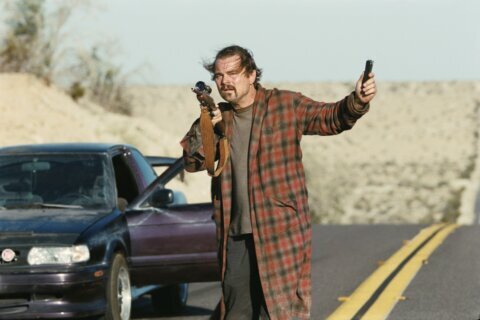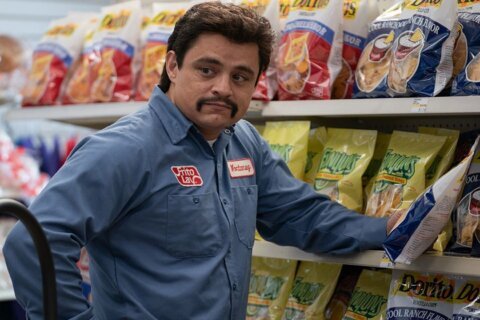WASHINGTON — He’s worked with some of the best directors of his generation: Spike Lee in “Do the Right Thing” (1989), Peter Weir in “Fearless” (1993), Robert Redford in “Quiz Show” (1994) and the Coen Brothers in “Barton Fink” (1991).
But John Turturro has also directed himself for decades with “Mac” (1992), “Illuminata” (1998), “Romance & Cigarettes” (2005) and “Passione” (2010) in a self-reflexive process.
“There’s less people you have to talk to. There’s a couple times it gets schizophrenic, but at the end of the day, I’m not gonna have a fight with the director,” Turturro says.
His fifth directorial effort, “Fading Gigolo,” is in select theaters after winning the Audience Award for Best Feature at the Miami Film Festival. It co-stars Woody Allen, who helped Turturro develop the script over the course of several years in a New York barber shop.
“I had a gut feeling that we would be good together. We have the same gal who cuts our hair, and just because we got to know each other, I would write it and he would give me feedback,” Turturro says.
“It was a real treat for me to be able to give my script to him and withstand his barrage of, how he would say, ‘brutal criticism.’ He likes to be ‘brutal.'”
Note: Turturro does a fine Woody Allen impression. See the audio links to the right.
In “Fading Gigolo,” Turturro plays Fioravante, a New Yorker who hatches a scheme with his friend Murray (Allen) to become a Don Juan as a way of making some extra cash. His clients range from the beautiful to the bizarre (Sharon Stone and Sofia Vergara), while competing with a Hasidic Jew (Liev Schreiber) for the heart of the virginal Avigal (Vanessa Paradis).
“It’s a profession that books have been written about,” Turturro says. “Movies have been made for years [and] so many actresses have won Academy Awards playing either a hooker or a nun.”
But he was drawn to the material for a more intimate reason, he says.
“I know there’s a lot of exploitation in [prostitution], but there is this direct transaction going on … and there are a lot of jobs where there isn’t that anymore,” Turturro says.
“People do hunger … for human contact, human intimacy, and without that, you can just dry up and disappear like a leaf blowing down the street in the wind.”
One of his biggest inspirations in tackling such material was John Schlesinger’s 1969 masterpiece “Midnight Cowboy,” starring a young Jon Voight as a prostitute in New York City. The movie boasts a legendary improv from Dustin Hoffman (“I’m walkin’ here!”), features legendary music by Harry Nilsson (“Everybody’s Talkin'” ) and remains the only X-rated film in history to win best picture.
“I couldn’t see it. I was 12 years old,” Turturro says, adding that he always wanted to see movies about adults when he was a child.
“I never wanted to see movies about 18-year-olds when I was 18 … unless it was ‘The Graduate.'”
“That’s not a movie that would be easily made today,” he says. “You would think we’ve progressed, but content-wise, we haven’t at all.”
Rest assured, Turturro has done his part to keep quality filmmaking alive.
After an uncredited debut in Martin Scorsese’s “Raging Bull” (1980) and a supporting role in Woody Allen’s “Hannah and Her Sisters” (1986), he landed a memorable part as the racist pizza shop worker Pino in Spike Lee’s masterpiece “Do the Right Thing” (1989), a collaboration that continued with “Mo’ Better Blues” (1990), “Jungle Fever” (1991) and “Clockers” (1995). Pino’s debate with Lee’s Mookie — and the ensuing montage of stereotypes in direct camera address — remains the most powerful cinematic statement against racism, from all sides, ever put on screen.
Even more fruitful was his collaboration with the Coen Brothers, who cast him as a gangster’s brother in “Miller’s Crossing” (1990), a tormented writer in “Barton Fink” (1991), an enigmatic bowler in “The Big Lebowski” (1998) and a fugitive from a chain gang in “O Brother, Where Art Thou?” (2000).
Turturro insists his best pure performance was playing Primo Levi in the biopic “The Truce” (1997), directed by Francesco Rosi, who continues to inspire Turturro’s own direction to this day.
“Marty Scorsese introduced me to him, and compositionally, his movies are some of the best you’ll ever see in your life,” he says.
“I saw how he did things. You can’t repeat it, but you can become aware of certain things.”
Yet of all his great roles, my favorite came in Robert Redford’s “Quiz Show” (1994), a fantastic film that unfortunately got buried in a strong year of “Pulp Fiction,” “Forrest Gump” and “The Shawshank Redemption,” but which features the finest acting Turturro and Ralph Fiennes ever did as dueling, cheating game-show contestants during the real-life quiz-show scandal of the 1950s.
“I had a great guy to draw on, the real guy,” he says.
“I gained a lot of weight for it — I gained like 35 pounds — but I loved working for Robert Redford and I loved working on Herb Stempel. That was a great character, and that was a big experience for me.”
Younger viewers more likely know him as Adam Sandler’s sneaky butler in the remake of “Mr. Deeds” (2002), or as Simmons in Michael Bay’s “Transformers” series (2007-2011).
The mix between such commercial successes and art masterpieces has left Turturro in a unique position to speak on both ends of the film spectrum.
“Some movies you see and say it’s all good, but there’s no life in it,” he says.
“Then sometimes you see movies that have a lot of life in it, but don’t have a lot of content, so it’s rare when you see something that … when you see it, you don’t forget it. …
“A lot of things are over-hyped,” he adds. “It doesn’t matter what won this, that, whatever. It’s what stays in your brain.”
Listen to the full interview here:
Follow WTOP Film Critic Jason Fraley on Twitter @JFrayWTOP, read his blog The Film Spectrum or listen Friday mornings on 103.5 FM.
Follow @WTOP and WTOP Entertainment on Twitter and WTOP on Facebook.








